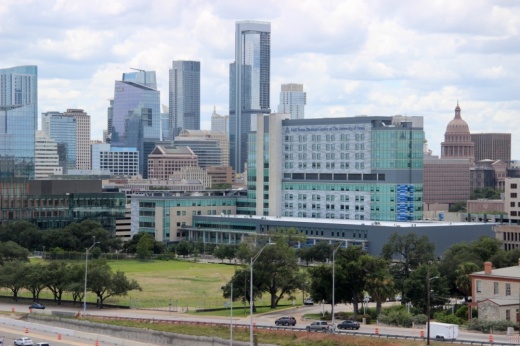The overview
The UT Medical Center will be located on the site of the former Frank Erwin Center arena in Austin's Innovation District, already home to several medical and institutional facilities. The complex will break ground next year and include a pair of medical towers: a UT Austin hospital and MD Anderson Cancer Center expected to include hundreds of beds in total.
Plans to redevelop UT's nearly 20-acre property were first announced two years ago ahead of the Erwin Center's demolition, and the complex is slated to open in 2030. This spring at the Capitol, lawmakers approved a bill to ease state restrictions on the site that could've limited the scope of the medical complex.
"What we’re looking at now is, if we have a little more linear space, ground space, then maybe we don’t need to build as tall. And that would be lower cost for us, and would preserve certain views that are important," MD Anderson President Peter Pisters told Community Impact in March, as legislation was under review. "We’re really looking at the Erwin Center site and opportunities to create a little bit more land on that site. Of course it’s a tight site, there are some historic buildings there, but the university and ourselves have a real desire to do something spectacular. And we’re really optimistic about what we can do.”
Zooming in
Capitol View Corridors—development limitations set under state law to maintain views of the Capitol dome—blanket land around town. The corridors effectively cap building heights on properties they cover, and can lead to project design changes to avoid crossing over the legal boundaries.
Several corridors currently cross the old Erwin Center site at 1701 Red River St., Austin, but lawmakers' approval of House Bill 3114 from state Rep. Charlie Geren, R-Fort Worth, will strike those regulations from the property. The update, which covers areas impacted by the ongoing I-35 lowering and expansion, also removes construction limitations on UT's Darrell K. Royal Memorial Stadium.
"The site of the former Frank Erwin Center is the future home of The University of Texas at Austin Academic Medical Center, including a new, state-of-the-art UT Austin hospital and a new world-renowned MD Anderson Cancer Center. Several of these view corridors would impact the space utilization of the site for construction purposes," Geren wrote in legislative materials. "This bill would eliminate certain view corridors and exempt the north end from height restrictions to allow UT-Austin to build two world-class hospitals and modernize the north end of the stadium."
After passing the House and Senate with broad support this spring, HB 3114 was signed by Gov. Greg Abbott in June. The Capitol View Corridor revision will now be effective in September.
UT didn't respond to a request for comment about the legislation this spring. In a statement, MD Anderson thanked lawmakers and the university system for advancing the change.
"The University of Texas MD Anderson Cancer Center is grateful to state Rep. Charlie Geren, author of House Bill 3114, and to Sen. Brandon Creighton, Senate sponsor. We also appreciate our colleagues at UT System and UT Austin for their work to help steer the bill through the legislative process," MD Anderson said in a statement. "With the bill’s recent signing, our teams are hard at work to develop plans for our future Austin campus. We look forward to building a world-class cancer center that allows patients in Austin and the surrounding region to receive the nation’s top cancer care close to home."
The legislative update came months after UT and MD Anderson announced a new research accelerator focused on cancer prevention and treatment. A university release stated that program would be "fortified and amplified" by the development of the new downtown medical center.
One more thing
While the legislative update impacts Texas' Capitol View Corridors, the city of Austin also maintains its own regulations that are largely in line with the state's. A city spokesperson didn't confirm how Austin's Capitol view restrictions might be adjusted in response to HB 3114 as of late spring, although an update is anticipated in July.
“The city is aware and has begun planning the necessary steps to operationalize new laws passed by the Texas Legislature. A staff briefing is expected to City Council next month," the spokesperson said in a June email.
Elisabeth Jimenez contributed to this report.





